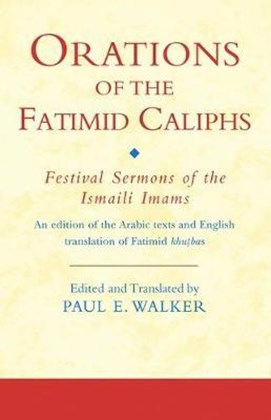Orations of the Fatimid Caliphs Festival Sermons of the Ismaili Imams: An edition of the Arabic texts and English translation of Fatimid khuṭbas
I.B. Tauris in association with the Institute of Ismaili Studies
The Fatimid empire flourished from the early 10th into the second half of the 12th century. Under the enlightened rule of this dynasty, Fatimid caliphs governed, first from North Africa and later from Cairo – a city founded by them – a domain extending from Arabia in the east to present-day Morocco in the west. As living imams of the Ismaili branch of Shiʿism, they exercised dual authority over both spiritual and secular realms.
The sermon – in Arabic the khuṭba – was (and continues to be) a standard feature of Islamic congregational observance. Fatimid caliphs took quite seriously and seldom missed the duty to deliver it on the twice-yearly occasion of the festivals of the breaking of the fast and of sacrifice. Eventually they added Friday sermons for the month of Ramaḍān. But, from all such occasions, we have precious few examples. Still those we have allow us to appreciate the event and the words uttered on it. This book provides unique access to them by presenting the Arabic originals with complete English translations. In addition, it includes a history of the Fatimid khuṭba – what was said, by whom and on what occasions – and an analysis of its themes and rhetorical strategies.
Preface and Acknowledgements
List of Abbreviations
Part One: Introductions
Chapter 1: A History of the Fatimid Khuṭba
A Fatimid khuṭba in Abbasid Iraq. Khuṭbas and khāṭibs. Festival khuṭbas by the Fatimid caliphs. Fatimid khuṭbas in North Africa. Khuṭbas by al-Manṣūr and al-Muʿizz. The first Fatimid khuṭbas in Egypt. Khuṭbas by al-ʿAzīz, al-Ḥākim, and al-Ẓāhir. The testimony of al-Musabbiḥī. The khuṭba from al-Mustanṣir to al-Āmir. Khuṭbas from the reign of al-Ḥāfiẓ onward. The eyewitness testimony of Ibn al-Tuwayr. The last khuṭba.
Chapter 2: Rhetoric and Themes in the Surviving khuṭbas
The audience. Double meanings for different audiences. The address to God: the khuṭba as a prayer. Qur’anic imagery and language. Praising God. Muḥammad as grandfather. ʿAlī as father. The Companions of the Cloak (aṣḥāb al-kisāʾ). Fāṭima as mother. Al-Ḥasan and al-Ḥusayn. The imams from al-Ḥusayn to al-Mahdī. The imams from al-Mahdī onward. The name of the dynasty. Enemies. Death and loss: fathers and imams. Pilgrimage. Miscellaneous themes.
Part two: The Khuṭbas
1. Khuṭba of al-Qāʾim:
On the ʿĪd al-fiṭr, 302 (19 April 915) at Alexandria
2. Khuṭba of al-Qāʾim:
Rajab 333 (March 945). During the siege of al-Mahdiyya. Read by al-Marwadhī
3. Khuṭba of al-Manṣūr:
As walī li’l-ʿahd (Heir-apparent) on the ʿĪd al-fiṭr, 334 (6 May 946) at al-Mahdiyya
4. Khuṭba of al-Manṣūr:
On Friday 14 Muḥarram 335 (16 August 946). Read by Jaʿfar b. ʿAlī, the Chamberlain, in the Mosque of Qayrawan
5. Khuṭba of al-Manṣūr:
On the ʿĪd al-fiṭr, 335 (25 April 947). During the siege of Abū Yazīd at Kiyana
6. Khuṭba of al-Manṣūr:
On the ʿĪd al-aḍḥā, 335 (2 July 947). During the siege of Abū Yazīd at Kiyana
7. Khuṭba of al-Manṣūr:
On the ʿĪd al-fiṭr, 336 (14 April 948) at al-Mahdiyya
8. Khuṭba of al-Manṣūr:
On the ʿĪd al-nahr, 336 (21 June 948) at al-Mahdiyya
9. Khuṭba of al-Muʿizz:
On the ʿĪd al-nahr, 341 (28 April 953) at al-Manṣūriyya
10. Khuṭba of al-Muʿizz
11. Khuṭba of Qirwash:
On 4 Muḥarram 401 (18 August 1010) at Mawṣil
12. Khuṭba of al-Āmir:
On a Friday, during Ramadan
13. Khuṭba of al-Āmir:
On the ʿĪd al-fiṭr
Glossary
Bibliography
English Index
Arabic Index
Arabic Texts
Paul E. Walker is a historian of ideas with special interests in Fatimid history and Ismaili thought. He is currently a research associate in the Department of Near Eastern Languages at the University of Chicago. His previous books include: Early Philosophical Shiism (1993), Abū Yaʿqūb al-Sijistānī: Intellectual Missionary (1996), Ḥamīd al-Dīn al-Kirmānī: Ismaili Thought in the Age of al-Ḥākim (1999) and Exploring an Islamic Empire: Fatimid History and its Sources (2002), and with Wilferd Madelung, The Advent of the Fatimids: A Contemporary Shi‘i Witness (2000).

